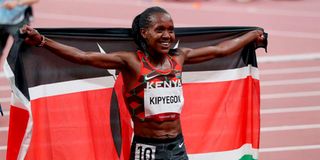Women aspirants should learn from Olympic mothers

Kenya's Faith Kipyegon celebrates after winning the women's 1,500m gold medal at the 2020 Tokyo Olympic Games at Olympic Stadium on August 06, 2021.
I sat up to watch an interesting feature on KTN about the life of Peres Jepchirchir minutes before she took to the marathon track on Friday midnight and won Gold at the 2020 Tokyo Olympic Games two hours, 27 minutes and 20 seconds later.
In the TV story, Peres keeps smiling and smiling, and giggling and giggling as she traces her journey from the little girl running just for fun on the village paths in Kapsabet to a world-conquering athlete.
On her first flight out of Kenya for an international race, she arrives at Oliver Tambo International Airport in South Africa to find no one is there to receive her and show her to the venue.
She politely approaches a random guy, tells him she needs to contact her local host urgently, and hands him a telephone number to make the call.
She finishes fifth, missing out on the prize money, but she is just happy to have cleared all the travel hurdles and got to compete in a major race.
String of successes
The South African experience is followed by a string of successes, which establish Peres as the elite athlete she is today.
Along the way, she continues to jump over one hurdle after another, including this time when she goes out to run to defend a previous record while pregnant. Peres’s story mirrors that of two other heroines of the 2020 Tokyo Olympic Games.
Faith Kipyegon, who won Kenya’s most assured Gold in the 1500m finals, was coming back from a pregnancy layoff to defend her title.
11th Olympics medal
America’s Allyson Felix won her iconic 11th Olympics medal on the back of a sponsorship deal fallout with Nike over her decision to get a baby in 2018.
The lessons in success by these Olympics mothers couldn’t have come at a better time for the Kenyan women currently considering running for various elective seats in the 2022 General Election.
Granted, female candidates still face many tough hurdles, including negative cultural attitudes towards women in leadership.
Political violence
They are often easy targets for political violence and have to outspend their male rivals in the campaigns to stand a chance of winning.
A recent research study on the cost of politics in Kenya by Tom Mboya and Karuti Kanyinga found that the more a candidate spends the more her or his chances of winning.
But the problem for women representation appears to start with low participation.
Only 1,051 women offered themselves for election as senator, governor, MP (National Assembly) and MCA in 2017 compared to about 13,000 men.
Civil society organisations like Mzalendo Trust and Mechanisms to Promote the Advancement of Women (MePAW) are currently working to get more women to participate in the next elections.
But they will need more women out there to learn from the courage and persistence demonstrated by Peres, Faith and Allyson in Tokyo.
[email protected]. @otienootieno





